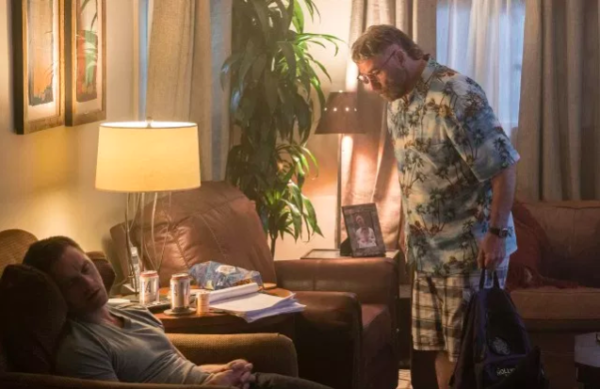
What happens when an obsessed fan pursues the object of his fascination beyond a reasonable end?
It’s not unusual for a film about stalking to insinuate (or outright state) that there is something wrong with the stalker. More often than not, the unhinged person in question is a woman and depending on the time of the film’s production, the coding of the insanity is typically gendered. In Fatal Attraction, Glenn Close is a proficient businesswoman…right up until she goes homicidal, at which point the bunny goes in the pot. In The Hand That Rocks The Cradle, Rebecca DeMornay is embroiled in the fantasy of a blissful domestic life from which she is excluded…and so the greenhouse roof must come down. There’s both a condemnation of the way that men take advantage of women, but also the suggestion that women simply can’t handle reality. It drives them crazy.
The gendered approach to stalking films becomes more complicated when the sex of the stalker changes. In 1981’s The Fan, Michael Biehn is a young obsessive who won’t let anything stand in the way of his favourite star of stage and screen, Lauren Bacall. He claims he loves her and even offers to take care of her sexually, but critics have leveraged the scene in which Biehn’s Douglas Breen visits a gay club to pick up a man whom he murders during oral sex as proof that the young man is actually queer. The reality is that there’s actually no confirmation.
In the feature film debut of Fred Durst (of Limp Bizkit fame), the writer/director partially eschews sexuality as a rationale for his protagonist’s motivations, seemingly in favour of unstated mentally illness.
Moose (John Travolta) is a Los Angeles street performer barely making financial ends meet. He spends most of his time and money on his primary obsession: movie actor Hunter Dunbar (Devon Sawa), though it is never clear why Moose is so fixated on what appears to be a generic performer*. Against her better impulses, Moose’s paparazzi photographer friend Leah (Ana Golja, also providing inane, sporadic voice-over narration) tells Moose about the Star Map app, which allows curious visitors to seek out the homes of the stars.
*The Fanatic also can’t decide if Hunter is an action star or a horror star. Moose refers solely to Hunter’s horror output, but the only posters and trailers seen are terrible looking action film.
After a series of disastrously failed attempts to procure a face-to-face meeting with Hunter so that he can get his autograph, Moose resorts to breaking and entering the star’s poorly guarded Hollywood home. While attempting to leave a note, Moose is confronted by Hunter’s maid/mistress Dora (Marta González Rodin), and in the ensuing melee Dora is killed, allowing Moose access to the house where he can hide and eventually photograph himself with a sleeping Hunter.
From here tensions escalate as Moose makes increasingly aggressive moves against his idol and a bloody battle ensues.

The Fanatic is treading fairly well-torn ground, but unfortunately it fails to bring anything new to the subgenre. Travolta’s presence would appear, on the surface, to offer a certain level of prestige; surely the project is worthwhile if Durst has managed to attract a highly recognizable star to his first major foray into film?
The answer is a resounding no. Travolta’s performance is filled to the brim with tics and quirks that suggest untreated mental illness. It is an acting choice, but not a good one; the performance is genuinely uncomfortable to watch and the fact that is goes unaddressed reads like mockery by Durst. Moose is child-like and combustible, a ticking time-bomb of aggression, but the script only ever treats him as misguided, even when he is advancing on someone while brandishing a knife.
Durst’s script is filled with such giant logic gaps and plot holes that virtually no amount of suspension of disbelief can compensate. There are people in Moose’s life who seemingly care for him – Leah, the kindly security guard on the strip, and a local comic book store owner who indulges Moose’s escalating interest in Dunbar. Nothing in Moose’s interactions with any of these people suggest he is anything other than unhinged, and yet all of them unwaveringly support and encourage him. Even when Leah sees first hand that Moose’s actions are escalating into illegal territory (he moves from getting kicked out of a private party to breaking and entering in just a few scenes), her stilted reaction is simply to gently remind him that he shouldn’t do that. It’s an incomprehensibly wrong reaction for a character who is clearly intended to be rationale human being who understands how the world works.
These kind of poor characterizations plague The Fanatic from top to bottom – none of the characters speak or act remotely like real people. The sole exception is Sawa, who leans into his role as a mildly sleazy, entitled B-level action/horror star. Sawa is the Gershon of this Showgirls-level debacle; he is the only one in on the joke and when he’s onscreen, The Fanatic briefly becomes a Lifetime-worthy guilty pleasure.
Alas, Durst’s worst instincts lead the film astray at every junction. The plot traffics in obvious developments except for the kind that lend the subgenre its greatest appeal, which is seeing the stalker take out the characters who are obstacles in the pursuit of their object of affection. Take, for example, street performer Todd (Jacob Grodnik) who routinely mocks and even physically assaults Moose. Aside from a brief skirmish, nothing comes of Todd – following his scuffle with Moose, he literally disappears from the film and is never seen again!
Add to this a ridiculous -and frankly insulting – ending whose logic is easily undone and whose commentary is laughably misguided. Altogether Durst’s uninspired workmanlike direction, the film’s cheap exterior shots of the strip and a genuinely offensive lead performance by Travolta renders The Fanatic tone-deaf and flat-out terrible.
The Bottom Line: This film is bad (though sadly not “so bad, it’s fun”). The simple reality is this: The Fanatic is a cinematic train wreck.
1/5
Hello I am the real Moose. No not on the spectrum. I wrote this film in 2006 with Fred. He re wrote it now says it’s about a real life stalker. Contact me if you want the real story. I am an actor / filmmaker and gay male. I have been friends with Fred for 12. Years. He cut me out.
Michael Moose Moutsatsos.